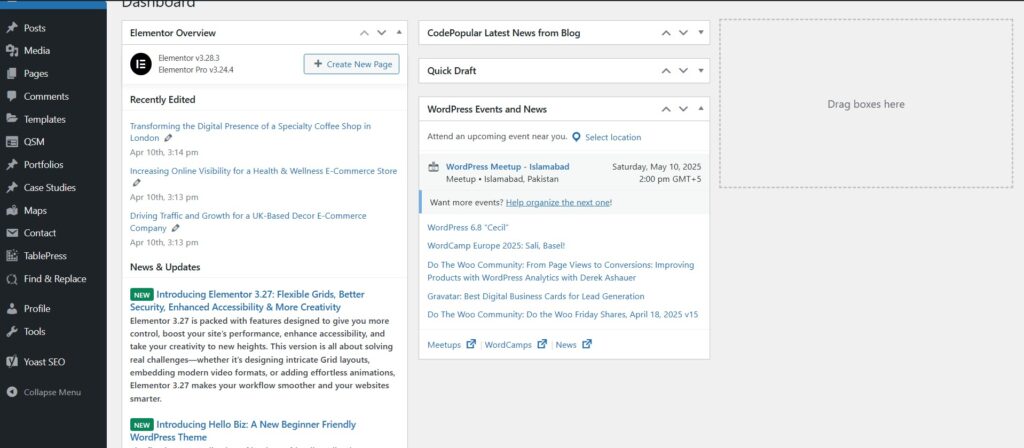When it comes to choosing the right content management system (CMS), two names often rise to the top: Craft CMS and WordPress. WordPress is the most widely used CMS in the world, originally built for blogging but now powering everything from personal blogs to large-scale enterprise websites, thanks to its open-source nature and massive library of plugins and themes.
Craft CMS, by contrast, is a modern, developer-first platform that emphasizes flexibility, clean architecture, and complete control over front-end development, which is perfect for building custom websites from the ground up. If you’re weighing the pros and cons of Craft CMS vs WordPress, this guide will walk you through the key differences and help you decide which one is the best fit for your project.
Comparison Table
| Feature | Craft CMS | WordPress |
|---|---|---|
| Ease of Use | Steeper learning curve; ideal for developers | Very user-friendly; great for beginners |
| Customization | Fully customizable with clean templating (Twig) | Highly customizable through themes and plugins |
| Plugins & Ecosystem | Smaller but high-quality plugin marketplace | Massive plugin ecosystem with thousands of options |
| Security | Strong out-of-the-box security, fewer vulnerabilities | Secure, but more exposed due to plugin variety |
| Performance | Lean, fast, and optimized for scalability | Can be optimized, but may require additional setup |
| Cost | Paid commercial license ($299+), fewer hidden costs | Free core; added costs for themes, plugins, support |
| eCommerce | Craft Commerce – robust and developer-driven | WooCommerce – easy to use, widely supported |
| Best For | Custom websites, agencies, developer-led projects | Blogs, small businesses, quick-to-launch sites |
Ease of Use: Which One Is More User-Friendly?
WordPress is famously easy to get started with, even for non-developers. Using pre-built themes and plugins, you can launch a website in minutes. The admin interface is intuitive, and there are tons of tutorials and documentation for beginners.

Craft CMS has a steeper learning curve, especially if you’re not a developer. However, for teams working with developers, it offers a clean, focused admin interface for content editors. Once set up, content authors often find Craft CMS more pleasant and less cluttered than WordPress.
Helpful Insight:
- If you’re DIY-ing your website, WordPress is likely the better fit.
- If you’re working with a developer or agency to build a highly tailored website, Craft CMS offers a cleaner, more elegant experience.
Customization and Flexibility: How Much Can You Do?
This is where Craft CMS shines. It doesn’t assume anything about your front-end; developers have full control over the design and structure using Twig templating. You can build exactly what you want, without working around pre-existing themes or plugin limitations. Many agencies offering web development services in the UK prefer Craft CMS for projects that require a highly tailored design and scalable architecture.
WordPress is customizable too, but often through themes and plugins. While you can achieve a lot, the system’s structure can sometimes get in the way of total flexibility, especially when working on more complex builds.
Helpful Insight:
- Craft CMS = Total control, fewer constraints, clean code.
- WordPress = Faster setup, but may require workarounds for complex designs.
Plugins and Ecosystem: Which One Offers More Tools?
With WordPress, the ecosystem is massive. There are over 50,000 plugins available, everything from SEO tools and contact forms to eCommeerc and learning management systems. Need to add a feature? There’s probably a plugin for that.
Craft CMS has a growing plugin marketplace, but it’s much smaller in comparison. The available plugins tend to be higher quality and more developer-focused. Also, Craft’s plugin store is built right into the admin panel, making it easy to manage.
Helpful Insight:
- WordPress is unbeatable for variety.
- Craft CMS plugins are fewer, but often more refined and built with performance in mind.
Security and Performance: Which One Keeps Your Site Safer?
Craft CMS is built with security in mind and offers a leaner, more modern codebase. Since it doesn’t rely on third-party plugins as heavily, and because the ecosystem is more controlled, it tends to have fewer vulnerabilities.

WordPress is secure, too, but its popularity makes it a bigger target for hackers. Many security issues stem from poorly maintained plugins or outdated themes. If you’re using WordPress, proactive maintenance and good security practices are essential.
Helpful Insight:
- Craft CMS = Lower risk out of the box.
- WordPress = requires vigilance, especially with plugins.
Cost and Licensing: What’s the Investment?
WordPress itself is free and open-source. However, premium themes, plugins, and managed hosting can add up quickly. You may also need to invest in maintenance or a developer if your site grows in complexity.
Craft CMS has a paid license model:
- Free for personal or trial use.
- $299 one-time fee for a commercial license, plus optional support and pro-level features.
Helpful Insight:
- WordPress = Low entry cost, potentially higher long-term maintenance.
- Craft CMS = Higher initial cost, but cleaner setup and potentially fewer headaches.
eCommerce Capabilities: How Do They Handle Online Stores?
WordPress is tightly integrated with WooCommerce, one of the most popular eCommerce platforms. It’s powerful, flexible, and works well for small to medium-sized online stores. There are tons of plugins for payments, shipping, and subscriptions.
Craft CMS offers Craft Commerce, a premium plugin built by the Craft team. It’s incredibly flexible and customizable, making it ideal for complex or custom eCommerce experiences, but it requires development expertise and has a higher learning curve.
Helpful Insight:
- WordPress + WooCommerce = Great for most online shops.
- Craft + Craft Commerce = Best for highly customized eCommerce needs.
At the end of the day, both Craft CMS and WordPress are excellent platforms. It all depends on your project’s needs, your team’s skillset, and your long-term vision.
If you want a website that’s fast to build and easy to maintain with tons of plug-and-play features, WordPress is a fantastic choice. If you’re aiming for a custom, streamlined, developer-powered experience with room for scalability, Craft CMS may be a better investment.





